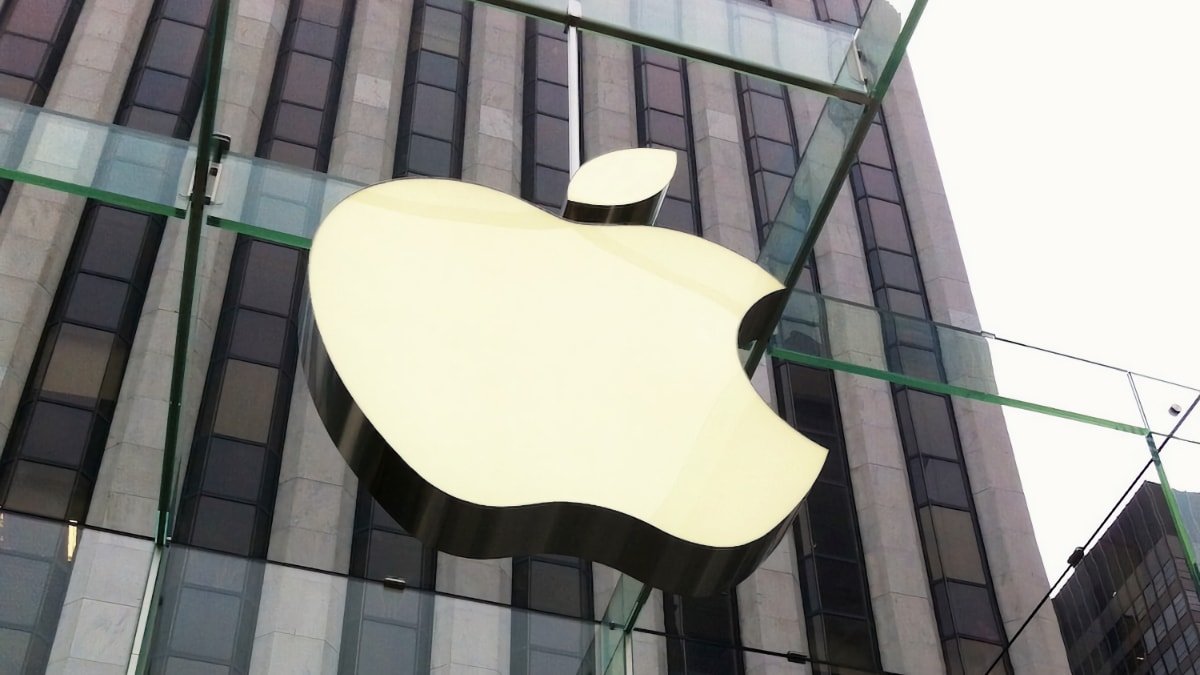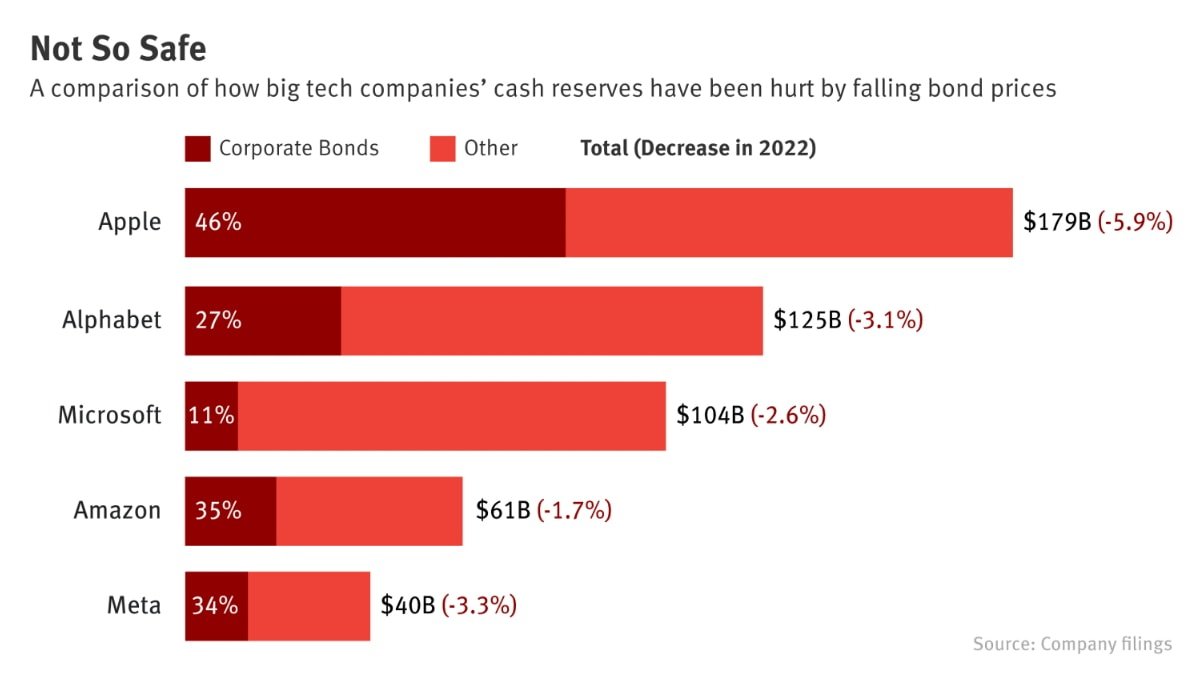Falling bond prices are affecting Apple's cash reserves
The bond market has seen a lot of sell-offs in 2022 due to rising interest rates, and Apple's cash reserves have been hit the hardest of all the big tech companies.
Corporate bonds have been affected more than government bonds this year, since corporations have a higher credit risk. US government bonds are considered risk-free assets.

Apple logo on building
Apple had almost half of its cash reserves in corporate bonds as of the end of June 2022, at 46%. It marked that portfolio down 7.2%, or $6.4 billion, to an estimated fair value of $82.47 billion.
The company marked $4.8 billion down on a mixture of US and foreign government bonds and mortgage-backed securities, the total value of which by the end of that quarter was approximately $69 million.
During the nine months leading to June 25, Apple reported that bond losses shrank its cash and investments by 6%, or $11.3 billion. The decrease in value was the equivalent of 12% of its operating profits for the same timeframe, according to The Information.
Apple's investments have fluctuated along with the rest of the market but haven't swung back as firmly. Its $11.3 billion in paper losses compare with the $555 million in gains it had by the end of September 2021.
Apple had reported paper gains of $2.4 billion by the end of the fiscal year 2020, while its total cash for 2020 and 2021 was approximately $190 billion.
The company reported it made a record-breaking $83 billion in the third quarter of 2022, a 2% year-over-year increase from the $81.4 billion in revenue reported in 2021. It also had an earnings-per-share of $1.20.
Other companies have been similarly affected. Amazon has about one-third of its $60.7 billion in cash reserves in corporate bonds, and it marked its portfolio down 3% as of June 30. Likewise, Meta Platforms also had about a third of its $40 billion cash reserves in corporate bonds by the end of June.

Big Tech cash reserves. Source: The Information
Meta marked those bonds down 5.4% during the most recent quarter to an estimated fair value of $12.9 billion. The company marked its $16 billion in government bonds down another 3.3%.
Alphabet had 27% of its $125 billion reserves in corporate bonds at the end of June, marking it down 4.1% to an estimated fair value of $34 billion. It marked $2.47 billion down on its mixture of government bonds and mortgage-backed securities, whose total value on June 30 was an estimated $62.7 billion.
Of the big tech companies, Microsoft was affected the least by falling bond prices, since it chooses to keep most of its reserves in government bonds.
The company has about one-tenth of its $104 billion reserves in corporate bonds, which it marked down 4.7% to an estimated fair value of $11.1 billion. For its government bond portfolio, Microsoft marked it down 2.7%, or $2.2 billion, at the same time.
Bond prices are expected to drop further in the September quarter, which will continue to affect Apple's paper losses. As of Friday, October 21, the S&P 500 Investment Grade Corporate Bond Index has fallen over 19% in the year to date.
Read on AppleInsider
Corporate bonds have been affected more than government bonds this year, since corporations have a higher credit risk. US government bonds are considered risk-free assets.

Apple logo on building
Apple had almost half of its cash reserves in corporate bonds as of the end of June 2022, at 46%. It marked that portfolio down 7.2%, or $6.4 billion, to an estimated fair value of $82.47 billion.
The company marked $4.8 billion down on a mixture of US and foreign government bonds and mortgage-backed securities, the total value of which by the end of that quarter was approximately $69 million.
During the nine months leading to June 25, Apple reported that bond losses shrank its cash and investments by 6%, or $11.3 billion. The decrease in value was the equivalent of 12% of its operating profits for the same timeframe, according to The Information.
Apple's investments have fluctuated along with the rest of the market but haven't swung back as firmly. Its $11.3 billion in paper losses compare with the $555 million in gains it had by the end of September 2021.
Apple had reported paper gains of $2.4 billion by the end of the fiscal year 2020, while its total cash for 2020 and 2021 was approximately $190 billion.
The company reported it made a record-breaking $83 billion in the third quarter of 2022, a 2% year-over-year increase from the $81.4 billion in revenue reported in 2021. It also had an earnings-per-share of $1.20.
Other companies have been similarly affected. Amazon has about one-third of its $60.7 billion in cash reserves in corporate bonds, and it marked its portfolio down 3% as of June 30. Likewise, Meta Platforms also had about a third of its $40 billion cash reserves in corporate bonds by the end of June.

Big Tech cash reserves. Source: The Information
Meta marked those bonds down 5.4% during the most recent quarter to an estimated fair value of $12.9 billion. The company marked its $16 billion in government bonds down another 3.3%.
Alphabet had 27% of its $125 billion reserves in corporate bonds at the end of June, marking it down 4.1% to an estimated fair value of $34 billion. It marked $2.47 billion down on its mixture of government bonds and mortgage-backed securities, whose total value on June 30 was an estimated $62.7 billion.
Of the big tech companies, Microsoft was affected the least by falling bond prices, since it chooses to keep most of its reserves in government bonds.
The company has about one-tenth of its $104 billion reserves in corporate bonds, which it marked down 4.7% to an estimated fair value of $11.1 billion. For its government bond portfolio, Microsoft marked it down 2.7%, or $2.2 billion, at the same time.
Bond prices are expected to drop further in the September quarter, which will continue to affect Apple's paper losses. As of Friday, October 21, the S&P 500 Investment Grade Corporate Bond Index has fallen over 19% in the year to date.
Read on AppleInsider

Comments
In the meantime, it is a good bet that Apple is taking fresh cash (from operations, from short term money market, from maturing bonds) and rolling it into higher interest bearing instruments
In short, this is a big nothing